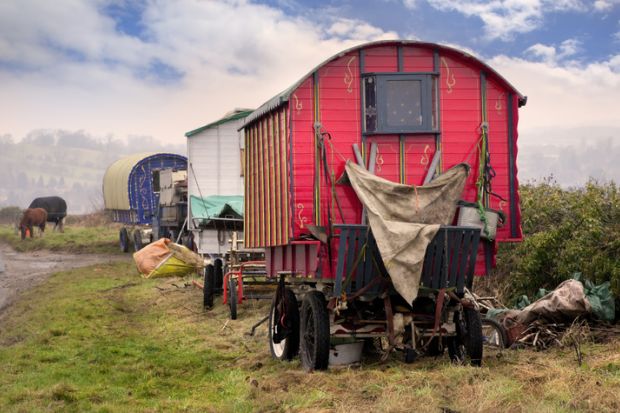If the measure of a society is how it treats its most vulnerable, then this past year has posed an unprecedented challenge. The coronavirus pandemic has shone a new light on inequalities, and the Black Lives Matter movement has reminded us how urgently we need to tackle the corrosive and malign influence of racism.
Yet, in spite of the many successes of universities in tackling inequalities, one group – the Gypsy, Traveller, Roma, Showmen and Boater community – continues to experience truly appalling disadvantage in the UK.
In 2016, Theresa May, then the prime minister, said: “If you’re a white, working-class boy, you’re less likely than anybody else in Britain to go to university.” While May was right to draw attention to this hugely serious problem, the assertion that no other group is less likely to go to university – which many continue to make – is false.
The mistake is revealed in the government’s annual statistics on young people’s participation rates. The latest figures show that by 19 years of age, 43 per cent of young people were in higher education. While this falls to 13 per cent for white, British, working class males, it drops to just 6 per cent for working-class Travellers and 5 per cent for Gypsy/Roma.
The challenges facing the Gypsy, Roma and Traveller (GRT) communities are well documented. In 2019, the UN Special Rapporteur, Tendayi Achiume, issued her report on contemporary forms of racism and racial discrimination in the UK. Describing the “invisibility, marginalisation and exclusion” experienced by GRT communities, she found appalling inequalities, including “lower life expectancy, high infant mortality rates, high maternal mortality rates, low child immunisation levels and a higher prevalence of anxiety and depression, as well as chronic diseases”. Achiume described the educational inequalities experienced by GRT communities as “especially dire.”
The government’s Race Disparity Audit, first published in 2017, found GRT pupils had the lowest attainment of all ethnic groups. The latest GCSE pass rates bear this out. In 2018/19, while 43 per cent of pupils in England obtained a good pass in English and mathematics, only 15 per cent of white British, working-class boys did so, and this figure drops to just 6 per cent for Gypsy/Roma pupils.
Some GRT communities have legal protection. Romani Gypsies, Irish Travellers, Scottish and Welsh Gypsy Travellers and Roma are entitled to protection from discrimination under the Equality Act 2010. It remains of concern that Showmen, Boaters and other Travellers (such as New Travellers) are not, and it is no surprise that all in these communities face prejudice, racism and hate crime.
In 2019, the Women and Equalities Select Committee reported on the inequalities faced by GRT communities. The committee noted that the prejudice and discrimination they face is so widespread – often described as the “last acceptable form of racism” – that many community members hold the view that it is just a “fact of life”: something they should simply accept.
In a 2020 report funded by the Ministry of Housing, Communities and Local Government, my Buckinghamshire New University colleagues, Margaret Greenfields and Carol Rogers, revealed hate crime against the GRT communities to be almost a daily occurrence: “as regular as rain”, as one of their respondents stated. The hatred has demonstrable impacts on mental health, including significant suicide risk. Among their participants, Greenfields and Rogers found that 100 per cent of Welsh Gypsies, 82 per cent of Irish Travellers, 80 per cent of Scottish Travellers and 32 per cent of Romani Gypsies reported having relatives who had attempted suicide in the previous five years. In 60 per cent of cases, the individual had spoken about experiences of hate speech and hate crime before their suicide attempt. One participant’s relative had said before he died that “there is no life for an uneducated Traveller man other than to be hated upon”.
In 2019, Buckinghamshire New University organised a House of Lords event hosted by Baroness Whitaker, co-chair of the All-Party Parliamentary Group for Gypsies, Travellers and Roma. At the event, I urged the development of a good practice pledge, an idea that Margaret Greenfields and I had been working on. With financial support from Research England’s Quality-related Research Strategic Priorities Funding, Margaret and our colleague Sherrie Smith (herself a Romani Gypsy graduate) worked with community groups such as the Advisory Council for the Education of Romany and other Travellers, Friends, Families and Travellers, and the Traveller Movement to develop the pledge. We are also grateful to the National Education Opportunities Network, the Office for Students and to other universities for their input and support.
We will be launching the “GTRSB (Gypsies, Travellers, Roma, Showmen & Boaters) into Higher Education” pledge on 20 January and we are delighted that the Office for Students references the pledge as one step that universities can take to support GRT students. There is no charge for signing the pledge. Institutions will self-report progress against four core commitments: data collection; organisational and institutional culture; outreach; and inclusion, celebration and commemoration.
After the year we have had, I hope senior leaders in higher education will take time to understand the experience of the GTRSB communities, sign the pledge, and implement changes to enable more GTRSB students to flourish. The pledge will not eliminate the inequalities they face, but I believe it is the best way universities can address the uniquely poor educational outcomes of the most forgotten groups within our society.
Nick Braisby is vice-chancellor of Buckinghamshire New University.
Register to continue
Why register?
- Registration is free and only takes a moment
- Once registered, you can read 3 articles a month
- Sign up for our newsletter
Subscribe
Or subscribe for unlimited access to:
- Unlimited access to news, views, insights & reviews
- Digital editions
- Digital access to THE’s university and college rankings analysis
Already registered or a current subscriber? Login







